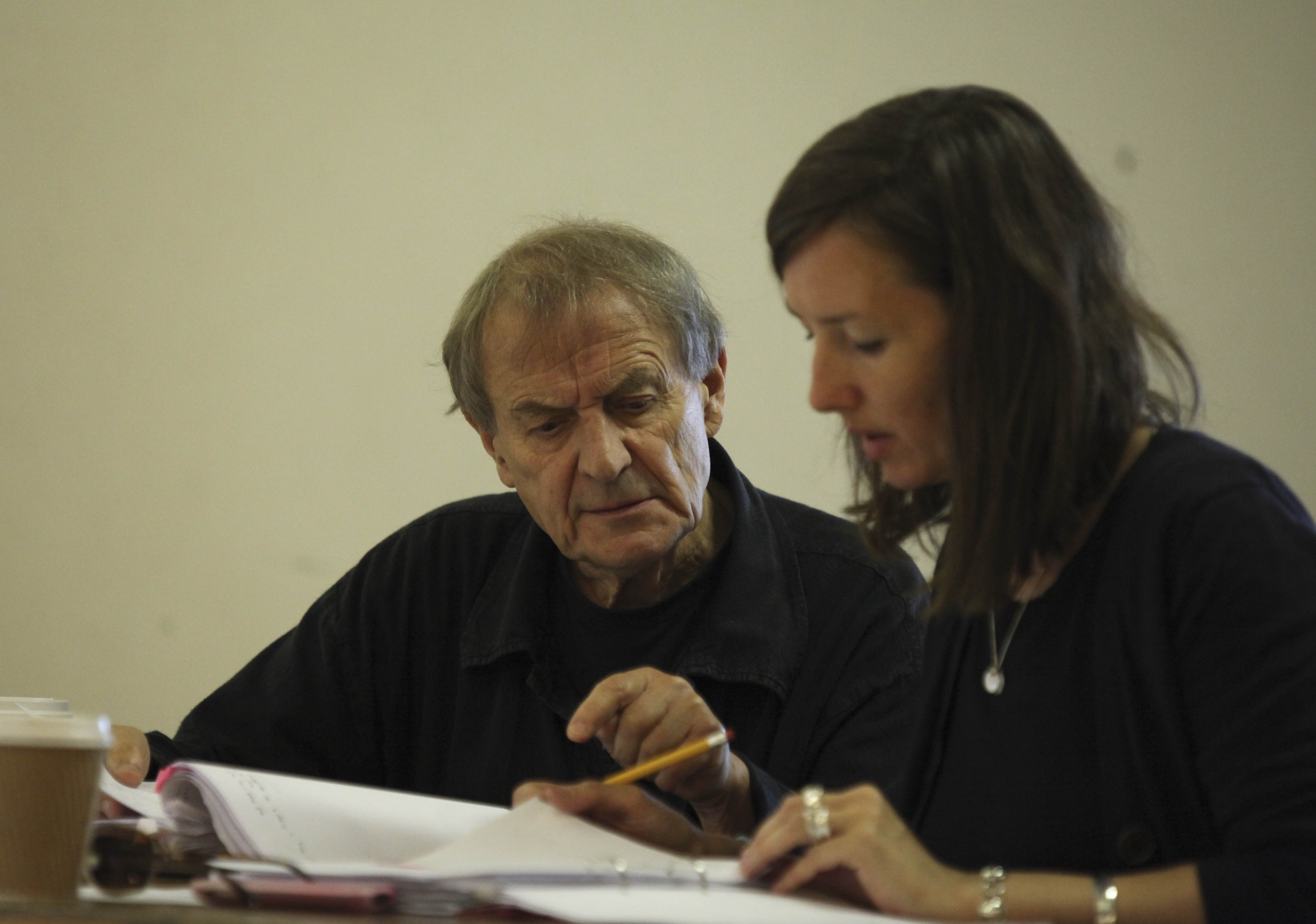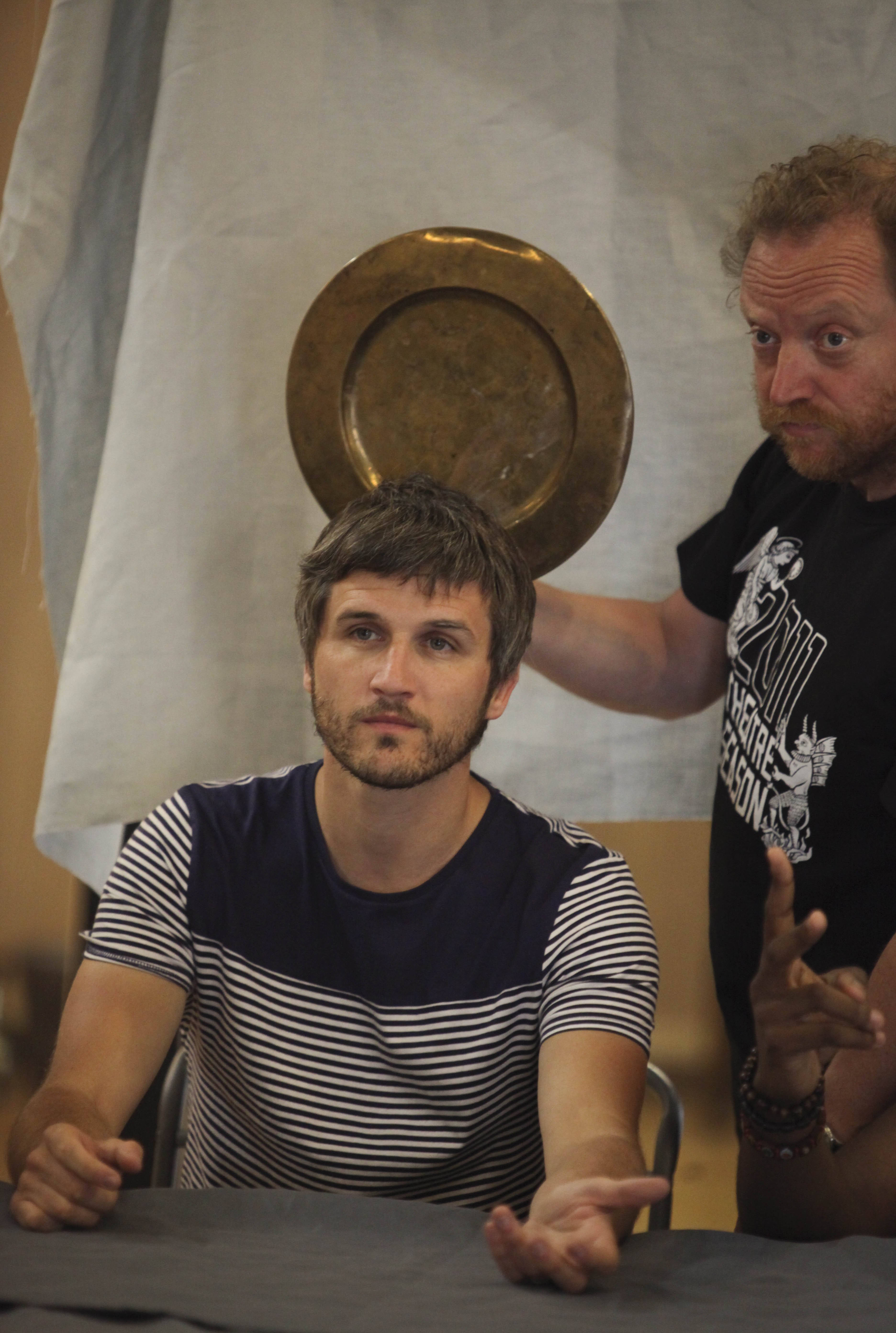The Globe Mysteries at Shakespeare’s Globe | reviews, news & interviews
The Globe Mysteries at Shakespeare’s Globe
The Globe Mysteries at Shakespeare’s Globe
If you thought Bible stories were just for Sunday school, think again
{rtmp width="510" height="310" img="http://www.theartsdesk.com/media/k2/items/cache/dc0900c4858a2f0dce82ed38..."}Mysteries{/rtmp}
If you thought Bible stories were just for Sunday school, think again. Shakespeare’s Globe - the open-air reproduction of the original “wooden O” on London’s Bankside where past and present collide and eager groundlings jostle in the Yard for the best view - is bringing them to vibrant life in this summer’s revival of The Mysteries. Based on medieval dramas created by guildsmen in York, Wakefield, Chester and Coventry, poet and playwright Tony Harrison first tackled The Mysteries for the National Theatre in 1977 and has adapted his iconic version to create The Globe Mysteries - featuring no fewer than 60 characters played by an energetic cast of 14, and telling a range of biblical stories from The Creation to Doomsday. But do modern audiences really want to listen to a sermon from the Middle Ages?
 Fortunately director Deborah Bruce insists that’s not at all what we’re in for. “These are stories about people, about what it means to be human, and they ask the big questions that we all ask at some point in our lives,” she declares. “Medieval audiences would have already known them well. They would have formed the foundation stone of their spiritual and cultural beliefs. That’s not so much the case now, but they’re still about exactly the same things we live with every day. We all feel jealousy, we all feel grief and regret and joy. They’re not historical documents, they’re about who we are. And they’re delightful for that.”
Fortunately director Deborah Bruce insists that’s not at all what we’re in for. “These are stories about people, about what it means to be human, and they ask the big questions that we all ask at some point in our lives,” she declares. “Medieval audiences would have already known them well. They would have formed the foundation stone of their spiritual and cultural beliefs. That’s not so much the case now, but they’re still about exactly the same things we live with every day. We all feel jealousy, we all feel grief and regret and joy. They’re not historical documents, they’re about who we are. And they’re delightful for that.”
William Ash, who has the potentially daunting task of playing Jesus in Bruce’s production, concurs with her vision of The Mysteries as grounded in universally familiar emotions and relationships. “I’m approaching Jesus as a real human being - someone who’s fallible, fragile,” he says. “The Jesus-God relationship in the play is an ordinary father-son relationship. The father has asked his son to do something, and he’s got to carry it out. He’s got to sacrifice everything about himself as a human being, and he goes through an awful lot of pain and anguish to do it. For me that’s what the production is about. It’s almost a rite of passage.”
Harrison’s language, accordingly, is bracingly immediate: “It's really anarchic, wicked and irreverent, yet he’s also more than capable of moving you with an intense intimacy,” says Bruce.
 And even the most divine figures are given an earthy representation: toiling to create the world in seven days, God makes use of a forklift truck.
And even the most divine figures are given an earthy representation: toiling to create the world in seven days, God makes use of a forklift truck.
The original Mystery cycles were performed on religious festivals and remained prevalent until the rise of professional theatre; their influence can be seen in Elizabethan and Jacobean drama, in which Shakespeare was, of course, a towering figure. At the height of their popularity, they were frequently performed on travelling carts. Eager punters would wait at open-air staging points often, according to Bruce, from three in the morning until midnight, and the plays in the cycle would trundle into view one by one.
At the Globe, of course, audiences can expect a much less gruelling experience. But the powerful sense of a communal event will, Bruce maintains, remain paramount. “The medieval Mysteries would have been played outside, often at markets and fairs,” she explains. “People in the audience would have been as much a part of the performance as the actors themselves, and that’s a very nice link with the Globe. You can’t eavesdrop on these stories, you have to witness them, be part of them. They have a presentational, demonstrative quality that demands acknowledgement. There’s no fourth wall. I think that’s going to be fantastic at the Globe.”
It’s key, too, that in the Globe, unlike in a conventional theatre, the stories unfold not beneath an ornate ceiling and a complex lighting rig but under the skies. “That means that as an individual you are constantly reminded of how small you are, and how responsible we are, as individuals, for each other and for the world we live in,” says Bruce. “The sky is a reminder of something outside the theatre, outside our own lives, and of what connects us all.”
And there’s one last, very important aspect of the production that makes it truly accessible: tickets start at just £5. To hear the word of God, albeit the most human of Gods, that’s got to be a bargain.
more Theatre
 Two Strangers (Carry A Cake Across New York), Criterion Theatre review - rueful and funny musical gets West End upgrade
A Brit and a New Yorker struggle to find common ground in lively new British musical
Two Strangers (Carry A Cake Across New York), Criterion Theatre review - rueful and funny musical gets West End upgrade
A Brit and a New Yorker struggle to find common ground in lively new British musical
 Testmatch, Orange Tree Theatre review - Raj rage, old and new, flares in cricket dramedy
Winning performances cannot overcome a scattergun approach to a ragbag of issues
Testmatch, Orange Tree Theatre review - Raj rage, old and new, flares in cricket dramedy
Winning performances cannot overcome a scattergun approach to a ragbag of issues
 Banging Denmark, Finborough Theatre review - lively but confusing comedy of modern manners
Superb cast deliver Van Badham's anti-incel barbs and feminist wit with gusto
Banging Denmark, Finborough Theatre review - lively but confusing comedy of modern manners
Superb cast deliver Van Badham's anti-incel barbs and feminist wit with gusto
 London Tide, National Theatre review - haunting moody river blues
New play-with-songs version of Dickens’s 'Our Mutual Friend' is a panoramic Victori-noir
London Tide, National Theatre review - haunting moody river blues
New play-with-songs version of Dickens’s 'Our Mutual Friend' is a panoramic Victori-noir
 Machinal, The Old Vic review - note-perfect pity and terror
Sophie Treadwell's 1928 hard hitter gets full musical and choreographic treatment
Machinal, The Old Vic review - note-perfect pity and terror
Sophie Treadwell's 1928 hard hitter gets full musical and choreographic treatment
 An Actor Convalescing in Devon, Hampstead Theatre review - old school actor tells old school stories
Fact emerges skilfully repackaged as fiction in an affecting solo show by Richard Nelson
An Actor Convalescing in Devon, Hampstead Theatre review - old school actor tells old school stories
Fact emerges skilfully repackaged as fiction in an affecting solo show by Richard Nelson
 The Comeuppance, Almeida Theatre review - remembering high-school high jinks
Latest from American penman Branden Jacobs-Jenkins is less than the sum of its parts
The Comeuppance, Almeida Theatre review - remembering high-school high jinks
Latest from American penman Branden Jacobs-Jenkins is less than the sum of its parts
 Richard, My Richard, Theatre Royal Bury St Edmund's review - too much history, not enough drama
Philippa Gregory’s first play tries to exonerate Richard III, with mixed results
Richard, My Richard, Theatre Royal Bury St Edmund's review - too much history, not enough drama
Philippa Gregory’s first play tries to exonerate Richard III, with mixed results
 Player Kings, Noel Coward Theatre review - inventive showcase for a peerless theatrical knight
Ian McKellen's Falstaff thrives in Robert Icke's entertaining remix of the Henry IV plays
Player Kings, Noel Coward Theatre review - inventive showcase for a peerless theatrical knight
Ian McKellen's Falstaff thrives in Robert Icke's entertaining remix of the Henry IV plays
 Cassie and the Lights, Southwark Playhouse review - powerful, affecting, beautifully acted tale of three sisters in care
Heart-rending chronicle of difficult, damaged lives that refuses to provide glib answers
Cassie and the Lights, Southwark Playhouse review - powerful, affecting, beautifully acted tale of three sisters in care
Heart-rending chronicle of difficult, damaged lives that refuses to provide glib answers
 Gunter, Royal Court review - jolly tale of witchcraft and misogyny
A five-women team spell out a feminist message with humour and strong singing
Gunter, Royal Court review - jolly tale of witchcraft and misogyny
A five-women team spell out a feminist message with humour and strong singing
 First Person: actor Paul Jesson on survival, strength, and the healing potential of art
Olivier Award-winner explains how Richard Nelson came to write a solo play for him
First Person: actor Paul Jesson on survival, strength, and the healing potential of art
Olivier Award-winner explains how Richard Nelson came to write a solo play for him

Add comment